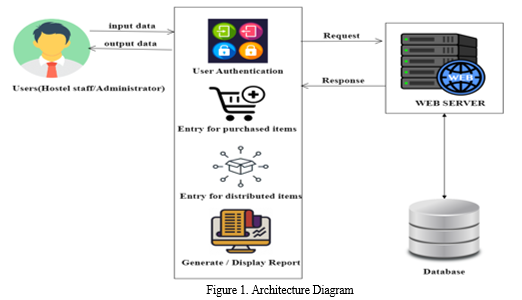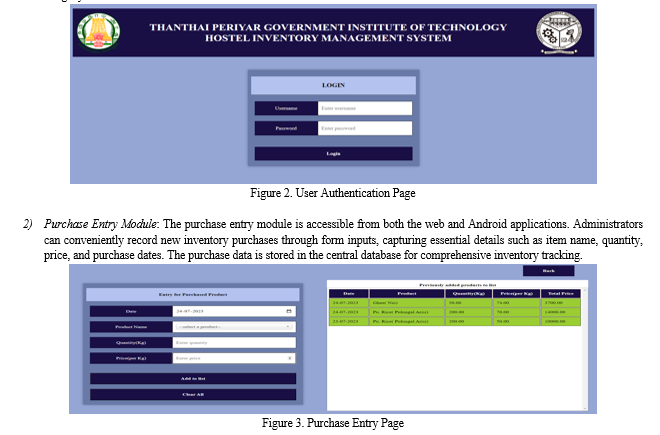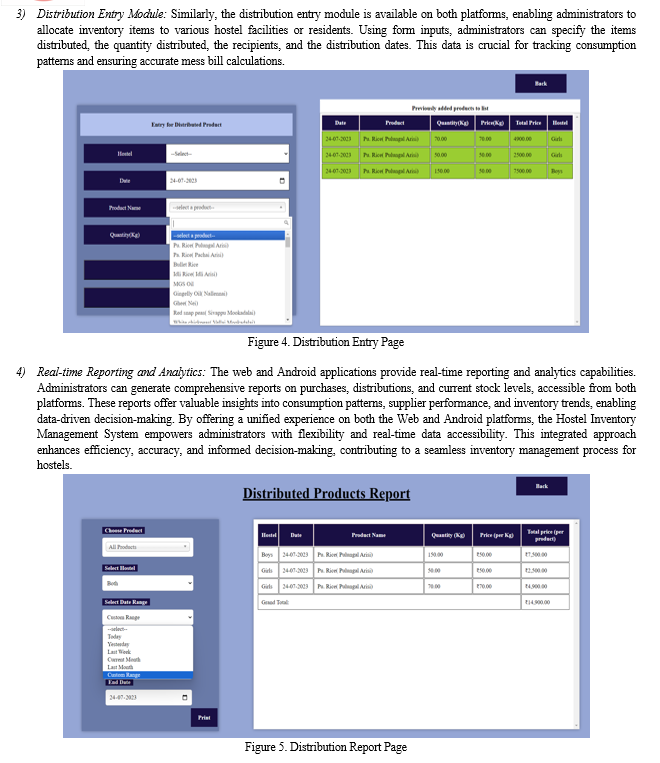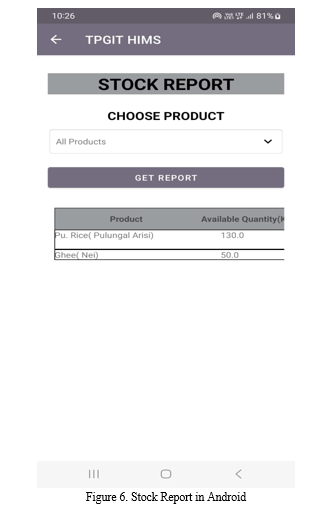Ijraset Journal For Research in Applied Science and Engineering Technology
- Home / Ijraset
- On This Page
- Abstract
- Introduction
- Conclusion
- References
- Copyright
College Hostel Inventory Management System
Authors: Dr. J. Sreerambabu, Mr. M. Mohammed Riyaz, Mr. D. Rajkumar, Mr. Tamilarasan D
DOI Link: https://doi.org/10.22214/ijraset.2023.55009
Certificate: View Certificate
Abstract
The Hostel Inventory Management System introduces an innovative web and Android application to revolutionize hostel inventory operations, maximizing efficiency, streamlining processes, and enabling data-driven decision-making. The user-friendly interface empowers administrators to manage inventory seamlessly, with real-time data recording and transparent stock management. The manual mess bill calculation is simplified using distribution reports, reducing errors, and enhancing billing accuracy, and resident satisfaction. Comprehensive reporting on purchases, distributions, and stock levels provides valuable insights for optimized purchasing decisions and efficient resource allocation. With exceptional operational efficiency and accuracy in mess bill calculations, this system elevates hostel performance through cost optimization and resident satisfaction. It represents a well-crafted application, prioritizing efficiency, accuracy, and data-driven decision-making for modern hostel inventory management.
Introduction
I. INTRODUCTION
A. Background
Hostels serve as essential accommodations for students seeking cost-effective lodging. However, the traditional manual inventory management processes within hostels often lead to inefficiencies, errors, and challenges in maintaining optimal stock levels. These issues can result in difficulties in tracking purchases and distributions, making it challenging to identify wastage and plan for restocking. Additionally, manual mess bill calculations based on records can lead to billing inaccuracies and resident dissatisfaction. To address these challenges and improve hostel inventory management, we propose the Hostel Inventory Management System—an innovative web and Android application designed to streamline processes, eliminate errors, and enhance data-driven decision-making.
B. Problem Statement
The existing manual inventory management systems used in hostels often result in inefficiencies and difficulties in maintaining optimal stock levels. Administrators struggle to accurately track purchases, distributions, and consumption patterns, which hinders their ability to identify wastage and plan for restocking. Furthermore, manual mess bill calculations are prone to errors, leading to billing inaccuracies and resident dissatisfaction. The Hostel Inventory Management System aims to overcome these challenges by providing a user-friendly interface for manual entry of purchases and distributions, along with generating comprehensive reports to facilitate manual mess bill calculations and other operations in a hostel.
C. Objectives
The primary objectives of the Hostel Inventory Management System are as follows
- Provide a user-friendly Web as well as an Android interface for manual entry of purchase and distribution data.
- Generate comprehensive reports on purchases, distributions, stock levels, and shortages to aid hostel administrators in making informed decisions.
- Simplify mess bill calculations based on the manually entered distribution data, reducing billing inaccuracies and improving resident satisfaction.
- Facilitate data-driven decision-making by providing valuable insights into consumption patterns and supplier performance.
D. Scope and Limitations
The Hostel Inventory Management System encompasses managing inventory tasks through manual data entry for purchases and distributions. The system provides comprehensive reports on stock levels and shortages to assist administrators in making informed restocking decisions. While the system aims to streamline processes and improve data accuracy, it does not automate purchase entries, distribution tracking, or mess bill calculations. Administrators will still manually input these data points into the system.
Due to budget and time constraints, the current implementation may include something other than advanced features like IoT integration or artificial intelligence for predictive inventory management. Nevertheless, the system's focus on providing valuable insights and enhancing manual inventory management is expected to improve operational efficiency and overall hostel performance.
II. METHODOLOGY
A. System Architecture and Design
The Hostel Inventory Management System adopts a client-server architecture. The web application is developed using PHP, HTML, CSS, jQuery, and JavaScript, and it is hosted on a server with a MySQL database. Concurrently, the Android application is built using Java and the Android SDK, utilizing the Volley library for seamless data communication with the server. This architecture ensures efficient data storage, processing, and retrieval, enabling real-time synchronization between the Web and Android platforms.

B. Technology Stack
The technology stack employed in the system includes
- Front-end: HTML, CSS, jQuery, and JavaScript are utilized to create a user-friendly and interactive interface for the web application. For the Android application, Java is chosen as the primary programming language, as it is widely used for Android development.
- Back-end: PHP is the selected server-side scripting language responsible for handling the web application's logic and interactions with the database. MySQL serves as the database management system, ensuring efficient storage and retrieval of inventory data.
- Android Development: Java, together with the Android SDK, is used to develop the native Android application, which facilitates seamless integration with the web application.
- Data Communication: AJAX (Asynchronous JavaScript and XML) is employed for asynchronous data communication between the web application and the server. For the Android application, the Volley library is utilized to handle network requests and responses efficiently.
C. Data Collection and Integration
Inventory data are collected through user-friendly interfaces provided by both the web and Android applications. Hostel staff can input purchase details and distribution records, which are then processed and securely stored in the MySQL database. The system ensures seamless integration and synchronization of data between both platforms, facilitating real-time accessibility to the latest inventory information.
D. Implementation and Testing
The system is implemented using an agile development approach, allowing for iterative development and continuous integration of feedback. Front-end development involves creating responsive and intuitive interfaces, while the back-end logic is implemented using PHP for seamless data processing. Java is used for developing the Android application, incorporating the Volley library for efficient network communication. Thorough testing is conducted at various stages, including unit testing, integration testing, and user acceptance testing. The web application is tested on multiple browsers and devices to ensure cross-platform compatibility, while the Android application is tested on different Android devices to ensure optimal performance. Bugs and issues identified during testing are addressed promptly to ensure a stable and reliable system. In conclusion, the methodology for developing the Hostel Inventory Management System adopts a robust architecture and technology stack to facilitate efficient data management and real-time synchronization. With a focus on user-friendliness and seamless integration, the system aims to enhance hostel inventory management and streamline processes effectively. The Hostel Inventory Management System offers a comprehensive set of features through both the web and Android applications, providing a user-friendly interface for hostel administrators to manage inventory tasks seamlessly.
III. SYSTEM FEATURES AND FUNCTIONALITY
A. Web and Android Applications
The Hostel Inventory Management System is an integrated solution, catering to administrators' needs on both web and Android platforms. Administrators can choose between working on their desktops or using the mobile application for flexibility and convenience, ensuring access to the same set of features and data.
1) User Authentication and Role-Based Access Control: Both the web and Android applications incorporate a secure user authentication system. Hostel administrators must log in using their credentials to access the system. The role-based access control ensures that each user can only access features relevant to their assigned roles, ensuring data confidentiality and integrity.



5. Editor Information Tracking: The system records editor information for each purchase and distribution entry. This includes the unique identifier of the responsible administrator, ensuring transparency and accountability in inventory management.
6. Reporting and Access Control: Supervisors can access and review the purchase and distribution entry audit trails, promoting accountability and responsible inventory management.
B. Mess Bill Calculation and Tracking
The system supports manual mess bill calculation and tracking, utilizing the distribution report for consumption data and transparent billing.
- Manual Calculation Process: Administrators manually perform mess bill calculations by cross-referencing distribution records with consumption data to ensure accurate billing.
- Itemized Mess Bill Statements: After calculations, administrators generate itemized mess bill statements, offering transparent breakdowns of items consumed and corresponding charges for each resident.
- Accuracy and Accountability: Manual calculations foster meticulous attention to detail and accountability in inventory tracking and billing processes.
- Periodic Billing Cycle: Administrators carry out periodic billing cycles based on distribution report data, generating updated mess bills at regular intervals for consistency.
- Billing Transparency and Discrepancy Resolution: Itemized mess bill statements provide transparency, allowing residents to review charges and resolve discrepancies promptly.
- Administrative Insights: The distribution report empowers administrators with valuable insights, enabling them to identify consumption patterns, optimize inventory management, and make data-driven decisions for efficiency improvements.
IV. SYSTEM IMPLEMENTATION AND RESULTS
A. Deployment and User Training
The Hostel Inventory Management System was seamlessly deployed within the hostel's administrative framework. During the deployment phase, rigorous compatibility testing was conducted to ensure smooth integration with the existing hardware and software infrastructure. User training sessions were organized to familiarize hostel administrators with the system's functionalities, data entry processes, and report generation. The comprehensive training aimed to empower administrators to efficiently manage inventory tasks and ensure accurate data entry.
B. User Feedback and User Experience Evaluation
Following the system's implementation, administrators provided valuable feedback on their experience with the Hostel Inventory Management System. User feedback surveys and one-on-one discussions were conducted to gather insights on system usability, ease of data entry, and overall user experience. The feedback was meticulously analyzed to identify any usability issues and make necessary improvements, focusing on enhancing user satisfaction.
C. Performance Metrics and Key Success Indicators
To evaluate the system's performance and measure its success, key performance metrics and success indicators were defined:
- Data Accuracy: The accuracy of manually entered purchase and distribution data, measured by the percentage of error-free entries.
- Time Efficiency: The time taken by administrators to enter inventory data and generate reports has been reduced compared to the previous manual approach.
- Inventory Transparency: The ability of administrators to access real-time inventory data and reports for better decision-making.
- User Satisfaction: Feedback from administrators on their satisfaction with the system's performance and usability.
V. IMPACT AND BENEFITS
The implementation of the Hostel Inventory Management System brought about significant benefits and improvements to hostel operations:
A. Streamlined Operational Efficiency
The system efficiently streamlined manual data entry processes, saving time for administrators. This allowed them to focus on other critical aspects of hostel administration, enhancing overall operational efficiency.
B. Cost Management and Resource Optimization
Accurate purchase and distribution data provided by the system enabled administrators to optimize inventory stock levels and make informed procurement decisions. This resulted in cost savings and more efficient resource allocation.
C. Data-Driven Decision-Making
Access to detailed reports empowered administrators with valuable insights into consumption patterns and supplier performance. Data-driven decision-making improved overall hostel management effectiveness.
VI. CHALLENGES AND SOLUTIONS
During development and implementation, the project faced challenges that were effectively addressed:
A. Technical Challenges Overcome
The team overcame technical challenges related to system performance, data validation, and user interface design through rigorous testing and collaboration with stakeholders, ensuring a reliable and user-friendly solution.
B. User Acceptance and Adoption
To ensure user acceptance, comprehensive training, and support were provided to administrators, helping them adapt to the new system and embrace its benefits.
C. Robust Data Security and Privacy
Data security and privacy were prioritized through robust encryption, access controls, and regular data backups, safeguarding sensitive information.
VII. FUTURE ENHANCEMENTS AND SCALABILITY
The system has the potential for further improvements and expansion:
A. Integration with IoT and Smart Devices
Future enhancements may involve integrating the system with IoT devices and smart sensors to automate data collection and streamline inventory tracking.
B. AI for Predictive Inventory Management
Implementing AI algorithms could enable predictive inventory management, optimizing stock levels and resource allocation.
C. Multi-Hostel and Enterprise-Level Support
The system's scalability can be expanded to support multiple hostels and enterprise-level inventory management.
VIII. ACKNOWLEDGEMENT
I acknowledge our Head of the Department Mr Dr. J. Sreerambabu, M.E., Ph.D., PDF, FIE, and our mentor Mr D. Rajkumar, MCA, who provided insight and expertise that greatly helped the research, for suggestions that greatly improved this manuscript. Special thanks, to our supervisor Mr M. Mohammed Riyaz, MCA, for the support in this research work.
Conclusion
The Hostel Inventory Management System successfully achieved its objectives, bringing significant improvements to hostel operations. It has proven to be an efficient and valuable tool for inventory management, cost optimization, and data-driven decision-making. As technology advances, further enhancements will strengthen its impact on the hospitality industry, driving even greater efficiency and effectiveness in hostel management.
References
[1] Y. Fan, \"Development of inventory management system,\" 2010 2nd IEEE International Conference on Information Management and Engineering, Chengdu, China, 2010, pp. 207-210, doi: 10.1109/ICIME.2010.5478077. [2] C. -C. Liang, \"Inventory Prediction in a Food-Processing-and-Distribution Company,\" 2013 Fifth International Conference on Service Science and Innovation, Kaohsiung, Taiwan, 2013, pp. 250-251, doi: 10.1109/ICSSI.2013.54. [3] R. Gustriansyah, D. I. Sensuse, and A. Ramadhan, \"Decision support system for inventory management in pharmacy using fuzzy analytic hierarchy process and sequential pattern analysis approach,\" 2015 3rd International Conference on New Media (CONMEDIA), Tangerang, Indonesia, 2015, pp. 1-6, doi: 10.1109/CONMEDIA.2015.7449153. [4] T. Tandel, S. Wagal, N. Singh, R. Chaudhari, and V. Badgujar, \"Case Study on an Android App for Inventory Management System with Sales Prediction for Local Shopkeepers in India,\" 2020 6th International Conference on Advanced Computing and Communication Systems (ICACCS), Coimbatore, India, 2020, pp. 931-934, doi: 10.1109/ICACCS48705.2020.9074234. [5] A, Manoj & Shah, Yogesh & Luitel, Chandra & Jaiswal, Ankit & S., Sajat. (2023). Hostel Management System (Report)
Copyright
Copyright © 2023 Dr. J. Sreerambabu, Mr. M. Mohammed Riyaz, Mr. D. Rajkumar, Mr. Tamilarasan D. This is an open access article distributed under the Creative Commons Attribution License, which permits unrestricted use, distribution, and reproduction in any medium, provided the original work is properly cited.

Download Paper
Paper Id : IJRASET55009
Publish Date : 2023-07-25
ISSN : 2321-9653
Publisher Name : IJRASET
DOI Link : Click Here
 Submit Paper Online
Submit Paper Online

